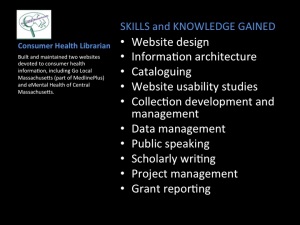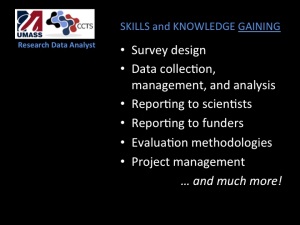I was invited to present a webinar to a group of military medical librarians. Originally, back in 2011 when I first got the invitation, I was going to offer up something related to eScience (based on a webinar I’d done for the NN/LM GMR around that time). A few hiccups along the way and the event got put aside for a few years. When the organizer came back to me late last year, I said that I was happy to still present, but that my job was different now. We decided upon the topic of transition in health sciences librarianship, i.e. how the profession is changing and how librarians within it can change, too. Here’s what I came up with:
While my job title has changed many times over the past ten years, most noticeably last December when I moved from the UMMS Library to the UMass Center for Clinical and Translational Science, I still think of myself as a librarian. I’ve done many things under that umbrella – tackled all kinds of projects and honed many skills. That’s one of the best parts about being an information professional today. Information drives so much of everything. The more you can learn, adapt, refocus, redefine, etc., the better off you’ll be in terms of having a fulfilling and enjoyable career – either within the walls of a library or not.
I heard a great presentation at MAHSLIN’s Annual Meeting last week by Jean Shipman, Director of the Spencer S. Eccles Library at the University of Utah School of Medicine (stay tuned for the sketchnotes). Besides the content – applying Lean process improvement principles to projects in her library – what I liked was how Jean structured her talk around 4 case studies. Her presentation followed another terrific one by Varang Parikh, Senior Process Improvement Specialist at UMass Memorial Healthcare. Varang covered the theory and then Jean offered some real-life examples from her library.
As I thought about how to structure my own talk, I thought about how there’s a lot of theory and a lot of talk about transitioning within the profession of librarianship. It’s helpful. What’s also helpful are some concrete examples, thus I decided to follow Jean’s lead and offer up myself as a case study for my talk.
I’ve worked for UMass Medical School for over 10 years. In that time, I can identify 5 distinct roles and/or jobs and/or titles and/or transitions within my career. I often tell people that this is the longest that I’ve ever worked at any one place, not to mention the longest that I’ve ever worked in any one profession. I think that the fact that I’ve been able to assume so many different roles is what’s made that possible. Who can get bored when you’re regularly doing something new?
So in my 10 years, I’ve been a consumer health librarian, a reference librarian, a research and scholarly communications librarian, an informationist, and now a research evaluation analyst. But remember what I said earlier, for me these are all facets of the same profession – librarianship and/or information science. They’re all about dealing with information, that’s the common denominator.
In each of these roles, I gained some knowledge and skills. I decided to take an inventory of these things, to see where they built upon one another or carried over from one role to the next. As a consumer health librarian, working on the projects, “MedlinePlus Go Local Massachusetts” and “eMental Health of Central Massachusetts,” I was able to both put to good use a bunch of things I’d learned in library school (this was my first job after graduating), as well as add some new skills to my toolbox.
The same thing happened, a couple of years later, when I got to move from being a grant-funded librarian to a full-time staff person. As a reference librarian (something I’d been doing all along, but now more formally), I added to my skill set, essentially adding to my value as a librarian.
As a research and scholarly communications librarian, I had the chance to do more of the same. I also learned during this time that I didn’t like administration. I don’t do it well, at least not in the context where I was working. I recently saw a colleague who’s moved from administration to teaching and data services in her library. We talked about how it’s hard in our world to not be made to feel like you’re somehow failing and/or taking a step backwards to not be an administrator. Supervision and management, for better or worse, is seen as the one “promotion” in many a business, including higher ed. It’s too bad, since we all know that there are many, many ways to improve in your career without taking that path. But alas, it’s our world. And I share this as encouragement for anyone who’s happy and content finding their professional way along a path that doesn’t necessarily go up a corporate ladder.
As in embedded research librarian and informationist, I gained a whole big grab bag of new skills. In many ways, it’s the transition that transitioned me most. If you read this blog with any sense of regularity, you know how all of these new skills and knowledge and projects emerged. And from them, I inventoried this nice list …
When I added all of these lists together, when I took my inventory of all of the librarian skills I’ve gained the past years, I was amazed. Whenever I teach library school students, I encourage them to start their list now. I offer the same idea/advice to seasoned veterans. Think of all of the things you’ve done in your work and all of the resulting skills gained. Write them down. Take an inventory. You’ll be amazed, too.
But more, my inventory was put to the test last year when I decided to take my skill set beyond the library altogether. When I applied for the position in the UMCCTS, I had to make the case that all of those library and information and data management skills made me well-prepared to take on the role of a research evaluation analyst. It wasn’t the easiest sell, either, but fortunately I’d also learned perseverance when it comes to making this argument. It’s something we’ve been doing for a long time now, as we’re continually put into the position of demonstrating our relevance and value. So, when our HR department asked me to map my very librarian-centric CV to the job requirements listed in the position announcement, I offered them this:
This was the job listing.
And these were my “maps”:
All I did for these was pull pieces from my CV and put them with the requirements. It was a great exercise (beyond landing me the job), because it forced me to prove what I’d been saying for awhile – that the skill set of a librarian, by any name, is pretty darned valuable and can offer a person any number of opportunities.
And of course, I’m still learning. My new job is filled with new challenges (opportunities for growth) that keep work interesting and fulfilling. For me, that’s the reward of taking the leap.
I left my audience yesterday with three takeaways:
Nobody makes “The Flying Wallendas” varsity team without years and years of practice (and good genes). And the little Wallendas don’t start off by leaping off the high platform. Scaffolding, nets, safety gear … it’s all there. And it’s there for librarians, too. In fact, I think that the library profession has to be one of the most interwoven, networked, supporting professions out there. It is, after all, our nature to share and to help. And we do so for one another all of the time.
Then eventually, you become so good at what you do that people don’t see the nets and the scaffolding. They only see you doing what you know how to do. And you know what else? It doesn’t matter what they call you, either. I feel most pleased when people simply say, “I call Sally because she can help.” It’s not “Sally the librarian” or “Sally the informationist” or “Sally the knowledge manager” or “Sally the evaluator.” Just Sally.
The last takeaway is “Step out in faith.” Just like Indiana Jones in “The Last Crusade.” Step out over the chasm between the library and wherever you want to take your skills and whether you see it or not, a bridge will appear under your feet to take you there safely. (If you don’t know this scene from the movie, seek it out. It’s a good one.)
So that’s what I shared with the group of librarians yesterday. I hope they enjoyed it and got something out of it. And by reading this, I hope you have, too.















You rock, Sally! I always appreciate the perspective and insight you bring to bear!
Sounds like a good talk!
Thanks, Holly! 🙂
I believe in this 100%! “Step out over the chasm between the library and wherever you want to take your skills and whether you see it or not, a bridge will appear under your feet to take you there safely.” Being game for adventure, Indy-style or other, is an asset in any career journey and essential to keeping imagination and energy intact (or, is that chicken/egg?). Great blog post!
Thanks, Emily! And you are a GREAT example of all I was saying. The best!! Hope to see you soon!
Sally, you master the art of inspiring others. Thank you for a wonderful post! (Which should be published in a journal).
Thank you so very much, Natalie. That’s so kind. Looking forward to seeing you soon!
Hey Sally – you have done it again! Your insights and knowledge are now documented and absolutely well presented for many to learn from and to be challenged! Thanks for this great case study extension and for your kind words!
Thank you, Jean!! 🙂